News
MEXT’s 2021 White Paper is a Door to the Future: Achieving "Diverse Happiness for Everyone" through "Integrated Knowledge" 2021 White Paper on Science, Technology and Innovation
Updated in September 2021
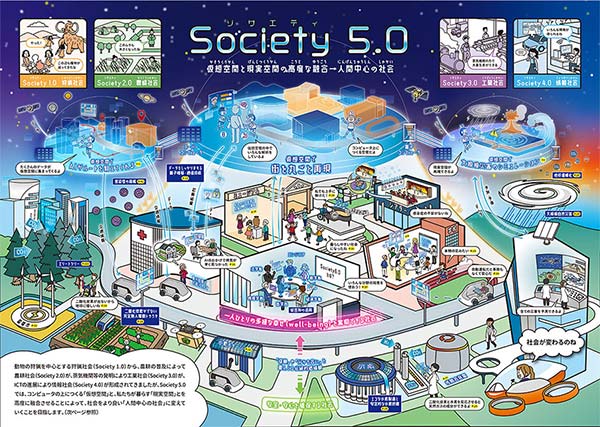
On June 8, the Cabinet approved the 2021 edition of the White Paper on Science, Technology and Innovation. The 2021 edition includes the realization of Society 5.0, specifically aiming to ensure safety and security and achieve each individual's overall well-being by utilizing "convergence of knowledge" that integrates knowledge from the natural sciences, humanities, and social sciences. The detailed illustrations depict life in the future society that we aim for in Society 5.0 and have plenty of hints on creating a human-centered community. The White Paper is truly a door to the future. Let's take a look at the 2021 edition of the White Paper with Tsuyoshi Shiota, Director of the Planning and Evaluation Division, Science and Technology Policy Bureau, MEXT, who was involved in its production.
Merging the virtual and the real through simulations
The White Paper features "Society 5.0," the future society we should be aiming for. The "White Paper on Science, Technology and Innovation" is not just an annual report. How will the world change in the future, and in what direction should we go? It is also a guide to the future, introducing science and technology to realize an ideal society.
In the history of development, we humans have passed through the hunting society (Society 1.0), where we hunted and gathered nuts, then the agricultural society (Society 2.0), where we settled down cultivating the fields and growing crops such as rice and wheat. Then eventually realized the industrial society (Society 3.0), where machines and equipment developed, and products were mass-produced. And the society we live in today is viewed as the "Information Society (Society 4.0)," with the spread of the Internet, computers, smartphones, and other devices that allow us to connect to information both domestically and internationally instantly and to diversify our communication.
"With the steam engine came the transition to an industrial society, and with the advancement of ICT (Information and Communication Technology) came the information society. Society 5.0 is a new society as follows: A human-centered society aiming to achieve economic development and solve social problems through a system that integrates virtual (cyber) space and real (physical) space, which is a concept that originated in Japan" Shiota said.
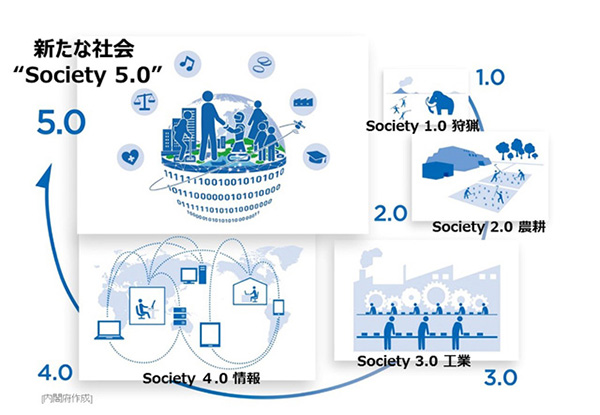
What does "merging virtual space and real space" mean?
A simple example of this is the simulation by the supercomputer "Fugaku" of the preventive effect of masks against the new coronavirus infection (COVID-19). The movie, which reproduced the droplet dispersion caused by coughing with and without masks, was a big hit and became the basis for recommending masks in real life. Also, a video production that simulates what would happen to a city recreated on a computer in a massive earthquake or tsunami is in progress. Efforts are also underway to use these simulations for evacuation planning and disaster-resilient urban development.
Society 5.0 has "an image of transformation towards a better, more human-centered society: Artificial intelligence (AI) analyzes a variety of information about the real world accumulated in a virtual space as big data and feeds back high value-added information to the real world." Shiota explains. The white paper introduces research and development of advanced technologies such as supercomputers and AI technologies for collecting various data in virtual space for data processing and analysis.
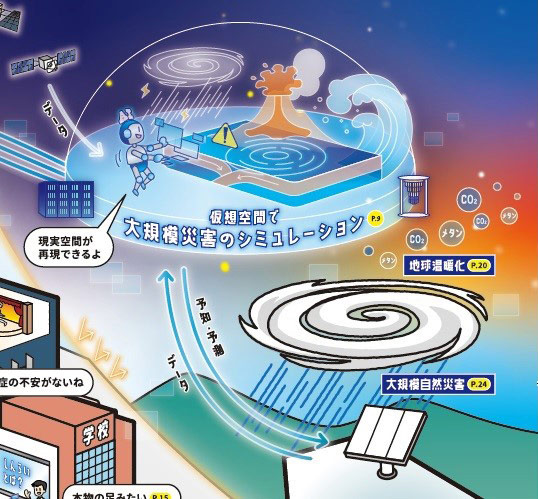
To realize a society where "no one is left behind"
Until last year, the "White Paper on Science, Technology and Innovation" was published with the name "White Paper on Science and Technology. What is the background to including ‘Innovation’ in the name this year?
The Basic Law on Science and Technology, enacted in 1995, is the backbone of the government's measures to promote science and technology. Based on this law, the government formulates the Science and Technology Basics every five years, a five-year plan which outlines it’s basic policy. The Basic Act was amended in June 2020 and renamed the "Basic Act on Science, Technology and Innovation." In line with this, both the Basic Plan and the White Paper were renamed. To better society, we need to utilize research and development results, such as discoveries, inventions, new products, etc., and disseminate them throughout the community. It is important to solve social issues through innovation. The name change reflects the belief that it is the creation of science and technology and innovation that will bring about the development of our country and humanity.
We face many social issues―for example, issues that Japan faces now, such as the declining birthrate, an aging population, and declining population, and problems common to all humankind, such as food, energy, and global warming. Society 5.0 is a society that addresses these social issues, is sustainable and resilient, ensures the safety and security of its citizens, and brings about their well-being.
Mr. Shiota explains, "This idea is in line with the SDGs adopted at the UN Summit 2015, which call for a sustainable, diverse, and inclusive society where no one is left behind."
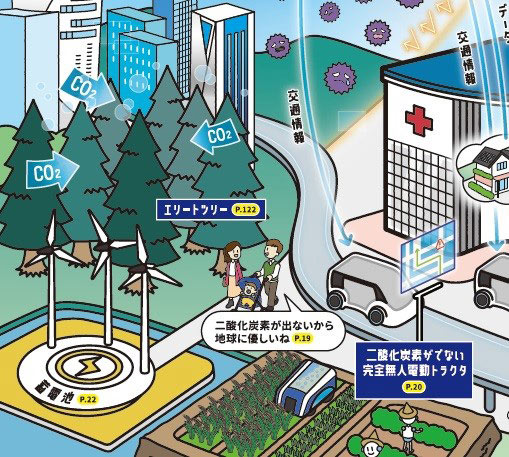
"Convergence of knowledge" necessary for insight into humans and society
In solving social issues, it is often impossible to solve them with knowledge of natural science alone. Taking the new coronavirus infection as an example, we need to think carefully about how measures to control the epidemic will affect the economic system and people's behavior. Not only the development of vaccines and treatments, but a wide range of knowledge is required, including sociology, economics, and psychology. The same applies to individuals. A wide range of knowledge and thinking is becoming necessary to understand and solve the problems we face.
Against this background, the humanities and social sciences are featured prominently as part of science and technology in the latest White Paper. To respond to increasingly complex social issues, we need deep insight into the nature of human beings and society. "The humanities and social sciences are precisely the disciplines that study how human beings and society should be. From now on, we need to make greater use of 'convergence of knowledge' that combines the humanities and social sciences knowledge with that of the natural sciences," Shiota says.
Shiota says that at the same time that knowledge from the humanities and social sciences is becoming more critical in solving social issues, there are more and more examples of the use of natural science methods in research in the humanities and social sciences. For example, there is the question of what human beings and society should do to address the widening inequality and poverty. The white paper introduces models of how researchers in psychology, economics, legal philosophy, and ethics have teamed up with researchers in brain science and other fields to study the brain's functioning to reveal that humans have a common interest in those less fortunate.
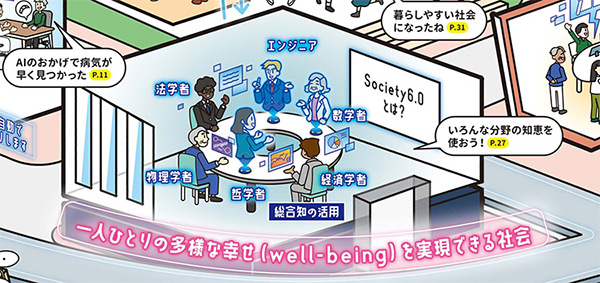
Strengthening basic research capabilities for the future
While emphasizing innovation, the white paper also mentions the importance of basic research and introduces issues and initiatives to enhance basic research capabilities.
While 18 Japanese have won Nobel laureates in natural sciences this century, the international standing in regards to the number of published papers continues to decline: from second in the world in the average number of papers in 1996-98 to fourth in 2016-18, and from fourth to ninth in the number of high-profile publications.
Also, each country’s index of R&D expenditure in the university sector, with 2000's expenditure taken as 1, was 2.5 in the United States, 2.2 in Germany, 1.8 in France, 2.3 in the United Kingdom, 19.0 in China, and 4.5 in South Korea in 2018, with Japan's index instead decreasing to 0.9.
To solve these problems and to think about and support the future of Japan, initiatives to strengthen research capabilities, such as providing financial support to doctoral students and supporting the diverse challenges of young researchers, are about to start.
What has been the impact of the new coronavirus infection?
The new coronavirus infection that shook the world also affected the direction of scientific and technological development. The technologies forecast by 2040, described in the 2020 edition of the White Paper, were predicted before the outbreak of the new coronavirus infection.
Due to the coronavirus epidemic, some of these predictions have been realized earlier than expected, and others have been delayed. For example, the development of technologies to promote work-style reform, such as technologies to improve the work efficiency of office workers and telework, and technologies for health crisis management, such as infectious disease detection and epidemic prediction, are expected to be realized earlier than initially predicted. In the "with corona" and "after corona" societies, we need to ensure safety and security and seek a community where we can achieve well-being.
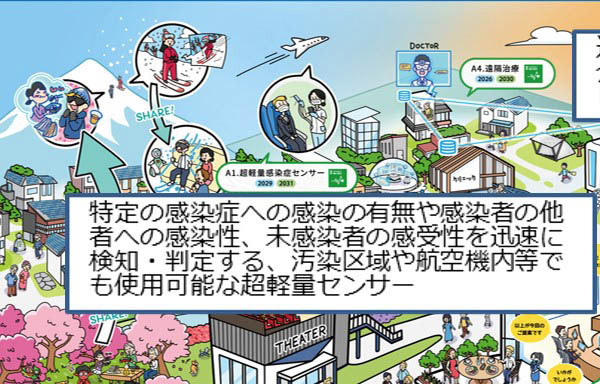
I hope people get a sense of the future society we're aiming for
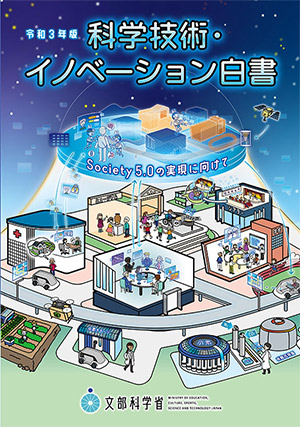
The white paper is published as a booklet and is also available on the MEXT website. Mr. Shiota says, "The white paper introduces Japan's most advanced efforts in an easy-to-understand manner using illustrations and photos, and also introduces related research examples and topics in columns throughout the book. For those who want to know more, you can use QR codes to connect to associated websites. I hope you will pick up the white paper and get an idea of what kind of society will be created by science, technology, and innovation and the future society we are intending to build.
The humanities and social sciences fields are now essential elements for creating science, technology, and innovation. The potential for young people to play an active role in the future society has increased even further. At the beginning of the white paper, there is an illustration of what kind of society ‘Society 5.0’ will be. If use the image as a reference while reading the article, you will understand more. Even if you think that science is not your thing or that science, technology, and innovation have nothing to do with you, please pick up this white paper. It will give you a glimpse of how we can live with science and technology in the future society we hope to create.
Original article was provided by Science Portal and Science Japan.
This has been translated by Sakura Science Club secretariat.
https://sj.jst.go.jp/stories/2021/s0811-01p.html









